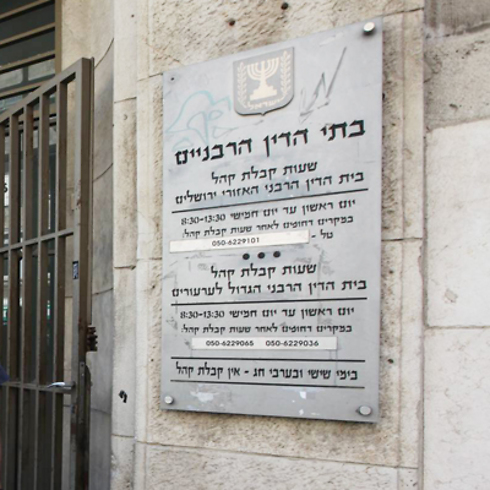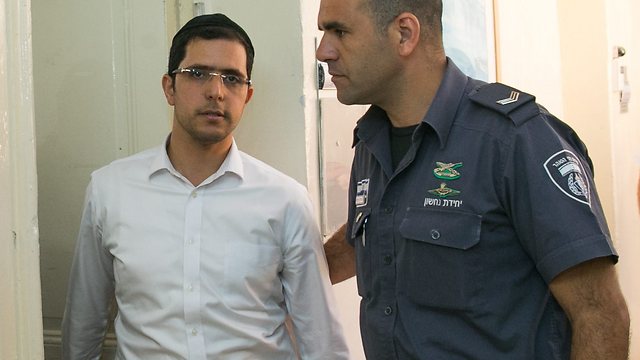
Suspected bribery exposed at Jerusalem's Rabbinical Court
A. was losing the fight for custody over his children at the Jerusalem Rabbinical Court until Rabbi Saar Mizrachi, a clerk at the court, offered to help him – in return for thousands of shekels in bribes. A. had no choice but to pay, until he had enough, recorded his incriminating conversations with another clerk, Yaakov Sebag, and turned to the police.
The two suspects in the affair are Rabbi Saar Mizrachi and Yaakov Sebag. Mizrachi, who is suspected of brokering bribes, fraudulently obtaining benefits and obstruction of justice, is a close associate of Rabbi Eliyahu Abergel, the chief judge at Jerusalem's Rabbinical Court, who is also expected to be appointed to a higher court.
Sebag, who is suspected of bribery, obstruction of justice and fraudulently obtaining benefits in aggravated circumstances, is a court scribe and the secretary of the judges’ panel headed by Rabbi Abergel.
On Thursday, the Jerusalem Magistrate's Court extended Sebag's remand until Sunday. Based on the documents filed by police, the judge determined that "a reasonable suspicion arises that Sebag received bribes in order to change court decisions" on Get (divorce), custody, visitation rights, state of exit orders and legal guarantees.
"The world is coming down on me, bribery at the Rabbinical Court?" A. told us several weeks ago. A.'s complicated divorce procedure, which includes the dividing of property and custody over the children, was being heard by the Jerusalem Rabbinical Court. "I was sitting in the court's hallway, and all of a sudden Rabbi Saar Mizrachi walks up to me. I knew him from before. He saw I was in despair and asked how he could help.
"I told him about the difficulties I was experiencing with the court and how my children were in danger. I told him I felt the court was biased against me and won't allow me or my rabbinical advocate to even make our claims properly. He went in to talk to the judges panel's secretary, Yaakov Sebag, and after a while he came back and led me to understand that money would help, and that if I wanted things to start being in my favor, I had no choice but to bribe. Without much of a choice, I gave him a thousand shekels in cash on the spot. I went home devastated. I committed grave acts, to get the most basic justice."
This encounter happened at the end of 2014 and A. says it dragged him into a whirlwind affair of bribery, during which he was repeatedly required to hand out envelopes of cash. About a month ago, before turning into a state witness, he decided to expose the story and came to us with his version, backed with documents and recordings. After he contacted Yedioth Ahronoth, the Jerusalem Police's Anti-Fraud Unit launched a covert investigation into the matter.
A nice bowl of fruit and envelopes full of money
"After I gave him a bribe for the first time, a game of ping-pong started," he says. "I put the money, a decision in my favor is made, suddenly something changes and Rabbi Saar is asking for more money. It continued this way for a time. In total, I gave him close to ten thousand shekels. At this point I didn't know where the money was going and I didn’t care very much. I was in the midst of a fight for my children. The fight over the property did not bother me as much as the fight for custody over the children."At first, the mother received custody over the children. After the older children refused to stay with her, they were transferred to the father's custody. One child, a minor, remained with the mother. It was A.'s concern for that child's fate that led him to expose the bribery at the Rabbinical Court.
Were the Rabbinical Court judges involved in the affair? Police sources claim the bribery was done on the clerical level only and that at this point, there is no evidence to incriminate judges of fraudulently obtaining benefits. However, it appears that even if no money directly got to the judges, and even if they were unaware of the bribery, testimonies indicate there were serious alleged offenses committed against due process of law and justice.
For example, according to A., Mizrachi got him two meetings with Judge Eliyahu Abergel, while Abergel was part of the judges’ panel presiding over his case. "One of the meetings happened inside the court and the other inside the judge's car. These were meetings in which the other side was not present, and in which I discussed the details of the case, and particularly the fate of the children, with the judge.”
Was money given to the judge himself?
"I don't know. I have no proof of that. I can only say that Saar is a wheeler-dealer who has ties with Rabbi Abergel. Saar prepped me to come with a nice bowl of fruit and an envelope of cash to Rabbi Abergel's home. I felt weak in the knees from that proposal and dodged it. You think what the repercussions of such a proposal are."
The turning point in the story happened when, during the Baba Sali hilula (an annual memorial ceremony to mark the passing of Rabbi Israel Abuhaṣeira, known as the Baba Sali) at the beginning of the year, A. met with the judges’ panel's secretary, Yaakov Sebag. According to A., "Sebag knew me from the hearings at the court. He approached me and asked me why I was transferring money through Rabbi Saar, who took a cut for himself, rather than directly to him. I agreed with him that I'll transfer the money directly to him. So I met with him several times and gave him several thousands of shekels.
"There were some strange situations in which he agreed to accept documents for the case only if I gave him two thousand shekels on the spot, at the courthouse. When I wanted to add a document about an ongoing police investigation against the mother, for example, Sabeg agreed to do so only in return for money. I was stumped that we were dealing with crucial decisions, with the danger posed to my children, and he only cared about money."
Over the past two months, A. decided he was not willing to continue in this manner any more, and explicitly refused to give Sabeg any more money. Meanwhile, A.'s ex-wife filed a request to cancel the stay of exit order for the youngest son to allow her to take him abroad. A. claimed to the court that his ex-wife had no intention of returning to Israel, and that her leaving the country endangers the minor. Eventually, the court decided that the mother could go abroad for a limited time, in return for leaving guarantees over the house she owns.
"The court ruled that twice, but then all of a sudden something changed and a decision was made to allow her to take the son abroad for only 50,000 shekels in guarantees," A. says in anger. "This is ridiculous. What if she leaves and doesn't come back? That is why I decided to take this story to the press."
After telling us his story, A. decided to go back to Sabeg and record their conversations. In some of these recordings, Sabeg is heard clearly talking about money, and stating a sum that would be "appropriate" in his opinion.
A.: "What can I do now? Tell me what do you want? How much do you want?"
Sabeg: "You want me to take from you for no reason and in the end you lose either way? You have no choice, go to the Supreme Court with a stay of execution."
A.: "How do you do this? How do you make this right? I'm willing to give you whatever it takes. Five? More?"
Sabeg: "I don't... listen, you owe money from before. But never mind, I don't talk about this on the phone. Here I can't (help). You have to compromise on the terms for him to release her (the ex-wife)."
A.: "So how do we move forward? What I owe you, I'll give you, no problem."
Sabeg: "We have to make sure she comes, I need to make her life difficult with the rabbi (judge Abergel). She'll come, I'll ask the rabbi where her apartment is. We said she needs to sign guarantees over the apartment. I'll try to do that. But I'm telling you, the rabbi is difficult with these things. I have an easier time with him on other things. I didn't know it'll be that hard for me to deal with him."
A.: "I'm telling you, I'm willing to give you whatever it takes."
Sabeg: "Let me think about it. I told you, even without you calling me I'm trying to do things in your favor. The fact you don't answer is your problem. It's your loss, you don't know what's going on with the case."
A.: "The question is what do we do now? Figure something out, you'll whatever you want. Just do something now."
Sabeg: "Okay, let me… I'll see what I can do."
A week later, the two had the following conversation.
A.: "At the time, you told me something that bothered me. That I owe you from last time. What do I owe you? What I owe I'll give you, first and foremost."
Sabeg: "Last time I managed to stop it for you."
A.: "What do I owe you? I don't remember. Say how much you want."
Sabeg: "I expect it to be what is customary..."
A.: "No, no. What I owe you, I'll give you. A thousand? Two thousand?"
Sabeg: "Bring something appropriate. You see it this way now because things are back to normal. But at the time you wanted one thing, you got it."
A.: "Is three appropriate?"
Sabeg: "You could say that."
A.: "Okay, no problem. Now, what do we do to move forward? You told me you could stop this."
Sabeg: "Not stop it completely, but try to convince him. They drive me crazy at the court. They won't let me work, they put me in the courtroom. They won't give me time. There's someone else in another panel. Out of kindness I help her. I can't help her."
A.: "When can we meet?"
Sabeg: "At 6 pm. Look, there hasn't been an final decision made, but okay, at least there'll be something."
A temporary slip or a system?
The next meeting between the two was documented by police cameras. "Recently, Sabeg received money several times to interfere with a case presided by the court," a police representative said during Sabeg's remand extension hearing. "And both times he was documented."If this is indeed the case, was this a temporary slip by Sabeg, or is this a wider-reaching phenomenon? In the recorded call, Sabeg says several times that he is aiding a woman with a case presided by another judges’ panel, and in another conversation he claims to A. that in the past, he influenced a judge that has already retired. During our investigation, another person told us that Sabeg asked him for money, and on Thursday, A.'s ex-wife was also questioned in connection with the case.
The Rabbinical Court said in response: "We are confident that law enforcement authorities will do their work faithfully and we will cooperate if required to do so."
Sabeg's attorney, Elimelech Kurzweil, said that "There is no basis for the claim that there was an attempt to influence court proceedings, and in any case, we completely deny the matter."
And attorney Shai Weiselberg, who represents Rabbi Saar Mizrachi, said "My client was questioned by police and cooperated fully. He claims that he did not pocket any money. Even according to the police, his role in this affair was minor, and therefore the court decided to release him under house arrest."













